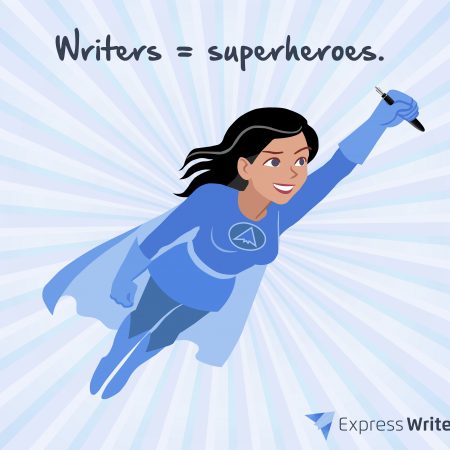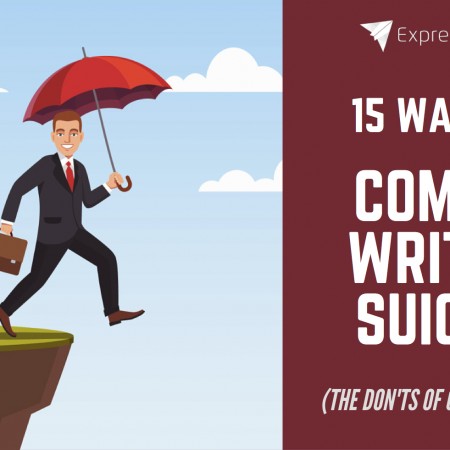10 Non-Excusable Reasons Why You Need a Writer
As a writing team, we’re constantly hired to fill in for a missing talent: the art of writing. We put our unique writing ability and style to good use to help companies grow organically. Good copy enables them to improve their communication with their targeted audiences, sell faster and better, and achieve bold marketing goals – that they didn’t even know they had in mind. Yes: written content can do all of that. What’s your superpower? Need a Writer? Two Solutions: Become an Overnight Creative Superhero, or Find One Maybe you consider yourself fairly decent with words. Let’s go further. Maybe you’re among the few wonders of the world who can solve a Rubix cube in the blink of an eye. You feel like you can count on your above-average analytical skills to deliver the best answers to your customers’ questions, challenges and concerns. But what if you can’t string one sentence together that can convert a reader? Turn someone visiting your site into a buyer? Activate their brain as they scan your content, so they automatically (and instantly) want to know more about you and buy whatever you’re selling? Those “activation” words, my friend, are the product of a true artist – a writer with the compound power of creative thinking and creative writing, at their disposal. I’ll be honest here: as a writer, you can’t just “be creative.” You have to be able to turn your creativity into a flow of words. A well-developed vocabulary helps. Online writing skills are a big help if you want Google to read your words, too. But you can’t try too hard, because it must come naturally. Thus, the best content is written. Easy as pie–if you have a natural, talented expert writer at your disposal. 10 Clear-Cut Reasons Why You (And Everyone Else) Truly Does Need a Writer Intrigued on what makes a writer so hire-able? Here are some of the biggest reasons we’re hired daily (and why you need a writer). 1. You Need Better-Than-Average Copy to Win with Google Today It’s funny my first point references a “robotic algorithm,” right? Well, they’ve actually come to a point of reading content like a real human–so they look for great writing in the copy. Useful stuff, that people will actually want to click on and read. (I’m serious. Google’s that advanced these days.) And they recently released their rulebook, aka Search Quality Evaluator Guidelines, which I’ve already discussed (read: dissected) in a previous blog here. In a nutshell, E.A.T is Google’s new name listing all the three key components that a page needs to meet its standards: A High Level of Expertise (E), Authoritativeness (A), and Trustworthiness (T). And then there’s Y.M.Y.L., which refers to the expert level content required for those high level industries (your money or your life – great rapper style, Google). If you think that your writing isn’t focused on expertise, authoritativeness, or trust: stop right now and rewrite everything until you come up with Google (and people)-friendlier versions, or put the pen down and let an experienced writer take charge. 2. You Don’t Want that Typo To Bring You Down OK: let’s say you have copy already written and you like it. I’ll give you the benefit of the doubt here. No matter what your content is about, a professional writer or copyeditor is your best bet to ensure your copy is error-free and solid. You don’t want to be the unintentional butt of that one humorous grammatical joke. I’m a professional copywriter, and I’ve been there: now, I always involve multiple people from our team in my own copy creation. Your answer: Nah, I’ve got this. I can proofread. #1: We’re all human, even the best of us. You’re going to miss an error at some point. #2: And have you ever proofread a ton of content? Because as your business and needs grow and you create more and more content, being your own editor gets a little…tedious. Refer to the below. Also, another short note on this point. An expert copywriter or is the best person to consult if you’re considering launching a tagline, slogan, or some other small bit of copy that will bring serious exposure. A writer can help you bring even more direct ROI from that little conversion phrase if they catch something, or perhaps save your business a ton of dough you’d lose if it wasn’t as good as it could be. Example: let’s say you’re starting a hashtag campaign. A professional writer can tell you if you’re falling in the danger of #SusAnalBumParty (a hashtag fail at trying to create a hashtag for Susan’s Album Party, for Susan Boyle, a few years ago). So, are we all looking forward to Susan Boyle’s #susanalbumparty? pic.twitter.com/AGZicIJq — ZOO Magazine (@ZOO) November 22, 2012 3. Your Brand Needs Great Content to Stay Relevant & Maintain A Competitive Edge Very few business owners have the creativity and analytical skills required to craft different types of web content that a brand requires to maintain an active presence both online and offline in today’s market. I’m not putting anyone down–there’s actually a lot of content types now you need to be creating to succeed online. And various types of content demand differing writing skills and knowledge. For instance, social media content is friendly, warm, and requires some marketing and conversational skills. On the other hand, web copy revolves around content SEO optimization knowledge, the ability to write targeted taglines and engage/direct your reader to ROI. For great blog content you have to know how to research certain topic well, and put it all together in a highly useful, informative, storified piece. Take an infographic–you have to know how to research, dig deep, and present it in an actionable, short, useful way. In all honesty, knowing how to mold your writing voice to each isn’t easy! You will need various writers for each type of web content that you’re planning on delivering. We have a social media manager, web copywriters, and blog copywriters who create our EW content. Our company counts on a team of specialized writers with experts … Read more









